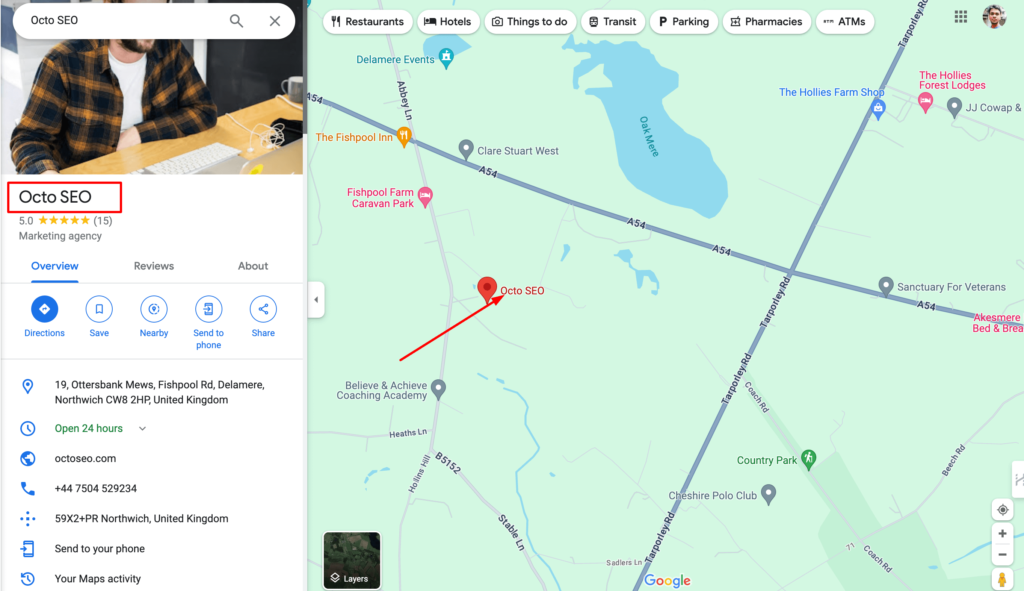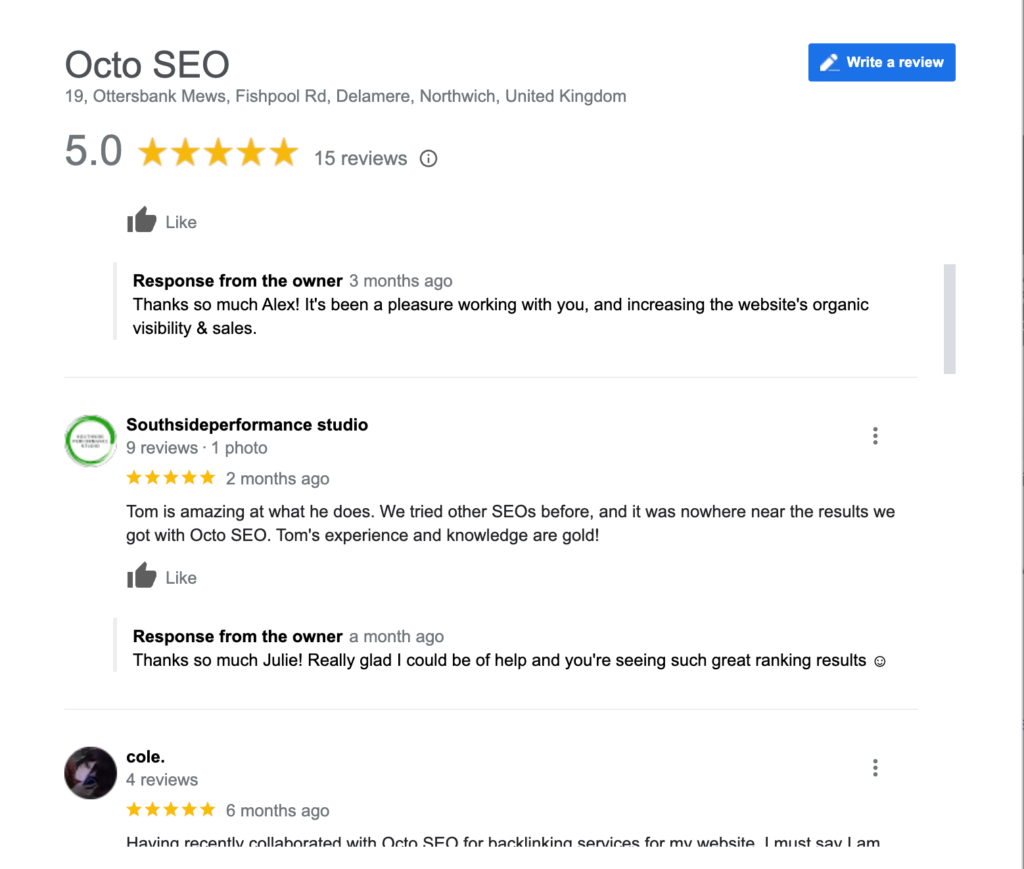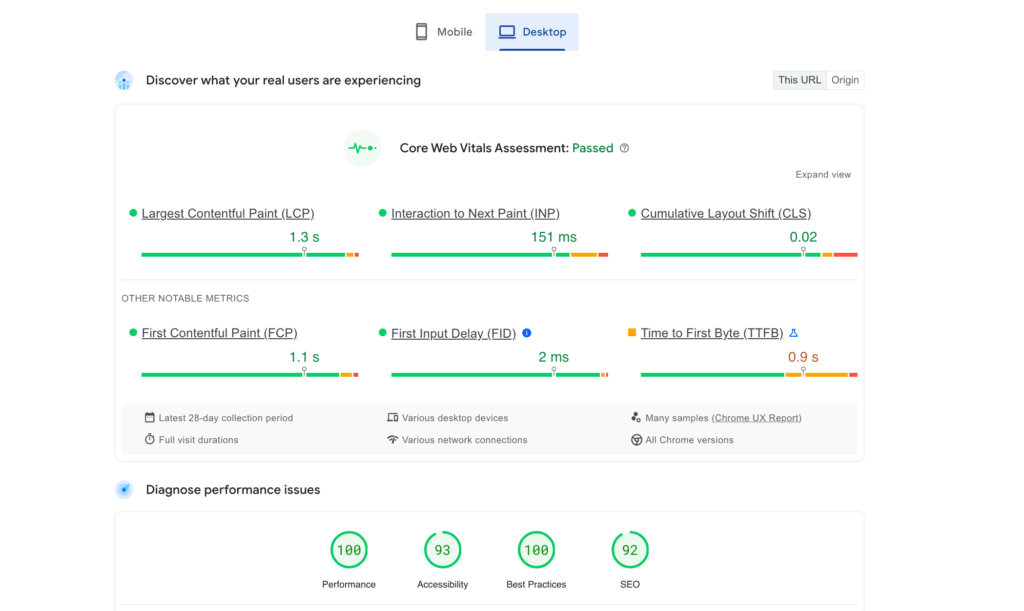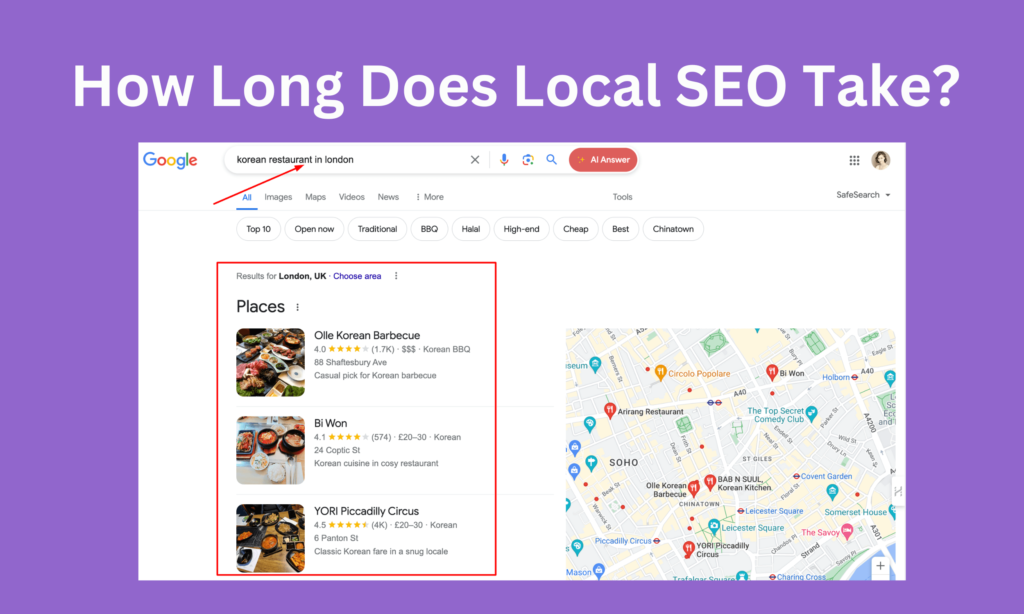Local Search Engine Optimization (SEO) is not a quick fix; it’s a strategic marathon. Many businesses dive into local SEO hoping for instant visibility and rapid leads. However, the reality is layered with complexity and demands patience. The burning question, “How long does local SEO take?” often pops up among entrepreneurs eager to boost their local online presence. The simple answer is: that it varies. Factors like industry competitiveness, local market dynamics, and your current SEO standing can significantly sway the timeline. This guide aims to establish realistic expectations, helping you navigate the journey of local SEO with a clear understanding of what to anticipate at every step.
What Is Local SEO?
Local SEO is a focused strategy aimed at optimizing a business’s online presence to attract more traffic from geographically relevant searches. These are searches on Google and other search engines where the intent is to find local products or services.

Why Is Local SEO Crucial for Your Business?
Have you ever wondered why the quaint shop around the corner suddenly popped up in your search? That’s local SEO at work, acting as the digital age’s word of mouth. Here’s why it’s indispensable:
Boosted Visibility
Local SEO puts your business on the map. When potential customers are searching online for nearby solutions, you want your business to greet them like a neighbor waving from across the street.
Targeted Traffic
Local SEO is like hosting a party and only inviting guests who’ll genuinely enjoy the festivities. It draws in an audience actively searching for your offerings in your locale.
Higher Conversion Rates
Local searches often lead to purchases at breakneck speeds. A substantial percentage of local mobile searches convert into sales, making it a fertile ground for businesses.
Community Trust
A robust local online presence establishes you as the go-to expert in your area. It’s about becoming a local hero, minus the cape.
Reduced Competition
Focusing on local SEO means you’re only competing with nearby businesses, not the whole world. It’s akin to playing in a local sports league with the benefits of major league visibility.
How Local SEO Works: A Simple Breakdown
Understanding local SEO is crucial, and here’s how it works in straightforward steps:
Google My Business
Think of Google My Business (GMB) as your business’s digital storefront. This tool lets you showcase your business at its best with complete listings, including location, operating hours, and photos. Ensure your profile is as detailed as possible.

Keywords
Keywords are the secret sauce to local relevance. Include terms like “near me” or “in [Location]” which locals might use to find services like yours. Incorporate these naturally into your content, including your website’s metadata and blog posts.
On-Page Optimization
Your website should resonate with local identity. This means having your Name, Address, and Phone Number (NAP) consistent across all digital platforms. It’s like always carrying an ID that proves you’re part of the community.
Customer Reviews
Encourage your customers to leave reviews. Positive feedback not only boosts your SEO but also helps convince potential customers to try your services.

Local Backlinks
Earn links from local clubs, newspapers, and businesses. Each local backlink acts like a community endorsement, strengthening your local credibility.
Mobile Optimization
With a majority of local searches performed on mobile devices, having a mobile-friendly website is critical. It’s about ensuring your digital doors are wide open for all visitors.
Factors Influencing Your Local SEO Timeline
Navigating the Local SEO landscape requires understanding several critical factors that can significantly influence how quickly you see results. Here’s a deeper dive into what affects the speed of your Local SEO outcomes, helping you to set realistic expectations and craft a more effective strategy.
1. Website Health
Just as a well-tuned sports car performs better on the race track, a well-optimized website sets the pace for your SEO efforts. Key aspects include:
Technical SEO
This includes ensuring your website is correctly indexed by search engines, fixing broken links, and making sure your site’s architecture is search engine friendly. Tools like Google Search Console can help you monitor and rectify crawl errors.
On-Page SEO
Utilize SEO best practices such as optimizing title tags, meta descriptions, and headers with relevant keywords. Also, ensure your URLs are clean and descriptive; this helps search engines understand and rank your content better.
Content Relevance
Keep your website’s content updated and relevant to your local audience. This involves understanding what your audience is searching for, the problems they’re trying to solve, and the language they use. Regular content audits can help identify gaps in your content strategy and opportunities for improvement.
2. Competition
The level of competition in your local area plays a significant role in determining how much effort you need to invest:
Market Saturation
In densely populated markets with many businesses offering similar services, you’ll need to enhance your SEO efforts to stand out. Analyzing what keywords your competitors are ranking for can provide insights into your strategy.
Competitor Strategies
Keep an eye on how your competitors are performing in terms of SEO. Tools like SEMrush or Ahrefs can help you understand their backlink profiles, content strategy, and more. Adapting and refining your strategy in response to competitors’ moves can be crucial.
3. Content Quality
Quality content is essential for engaging and retaining visitors:
Engagement
Create content that is not only informative but also engaging. Use formats that encourage interaction, such as videos, infographics, and quizzes.
Relevance
Ensure that all content is tailored to meet the specific needs and interests of your local market. Use local events, news, or trends as a springboard for creating relevant content.
Freshness
Updating old content and regularly adding new pages can signal to search engines that your site is active. This freshness can improve rankings, especially if the updates respond to the latest industry trends.
4. User Experience (UX)
A seamless and enjoyable user experience is critical for keeping visitors on your site longer, which in turn can boost your SEO:
Mobile Optimization
With the increasing prevalence of mobile searches, ensure your website is responsive and loads quickly on all devices.
Navigation:
Easy-to-use navigation is crucial. It should require minimal clicks to get from one page to another, and important information should be easily accessible.
Page Speed

Use tools like Google PageSpeed Insights to identify and fix elements that slow down your website. Fast-loading pages improve user experience and are favored by search engines.
5. Backlink Profile

Backlinks are among the top factors considered by search engines for ranking a site:
Quality over Quantity
Aim to get backlinks from websites that are authoritative and relevant to your industry. One high-quality backlink can be more impactful than dozens of low-quality ones.
Relevance:
Seek out backlinks from local sources like newspapers, blogs, and business directories. These links help reinforce your local relevance to search engines.
6. Consistency and Adaptability
Being consistent and adaptable in your SEO strategy is necessary for long-term success:
Continuous Improvement
Regular analysis of your SEO performance can help you understand what’s working and what’s not. This continual improvement cycle ensures that your strategies are always optimized.
Algorithm Updates:
Stay updated with Google’s algorithm changes to ensure your SEO tactics remain effective and compliant. This might mean adjusting your content strategy or technical SEO practices to align with new updates
7. Local Engagement
Engaging with your local community both online and offline can significantly enhance your local SEO:
Local Events and Sponsorships
Participating in or sponsoring local events increases your visibility and establishes your business as an active community member.
Collaborations with Local Businesses
Collaborations can lead to shared content, joint marketing efforts, and mutual backlinks, all of which can boost your local SEO.
Conclusion
Embarking on a Local SEO journey is akin to planting a garden; it requires nurturing, patience, and time before you can enjoy the fruits of your labor. By understanding the factors that impact the effectiveness and timeline of your local SEO efforts, you can set realistic expectations and systematically work towards achieving them. Remember, Local SEO is not just about visibility—it’s about connecting with your community, building trust, and ultimately growing your business. Stay committed, and stay consistent, and the results will follow, proving that the effort is well worth the investment.
How long should I expect to wait before seeing results from Local SEO?
Typically, you can start seeing noticeable improvements within 3 to 6 months, but it could take up to a year for more competitive industries or markets.
Can I accelerate my Local SEO results?
While SEO generally takes time, you can potentially speed up the process by consistently producing high-quality content, optimizing your website’s user experience, and actively engaging in your local community.
Is Local SEO only beneficial for small businesses?
No, businesses of all sizes can benefit from Local SEO. It helps any business that has a physical location or serves a specific geographic area connect more effectively with local customers.
How often should I update my Local SEO strategy?
Local SEO requires ongoing attention. Regularly update your Google My Business profile, respond to reviews, refresh your content, and stay abreast of the latest SEO practices to maintain and improve your rankings.
Does online reputation management play a role in Local SEO?
Absolutely! Managing your online reputation, including how you respond to reviews and engage with customers online, can significantly impact your Local SEO success by building trust and credibility.

